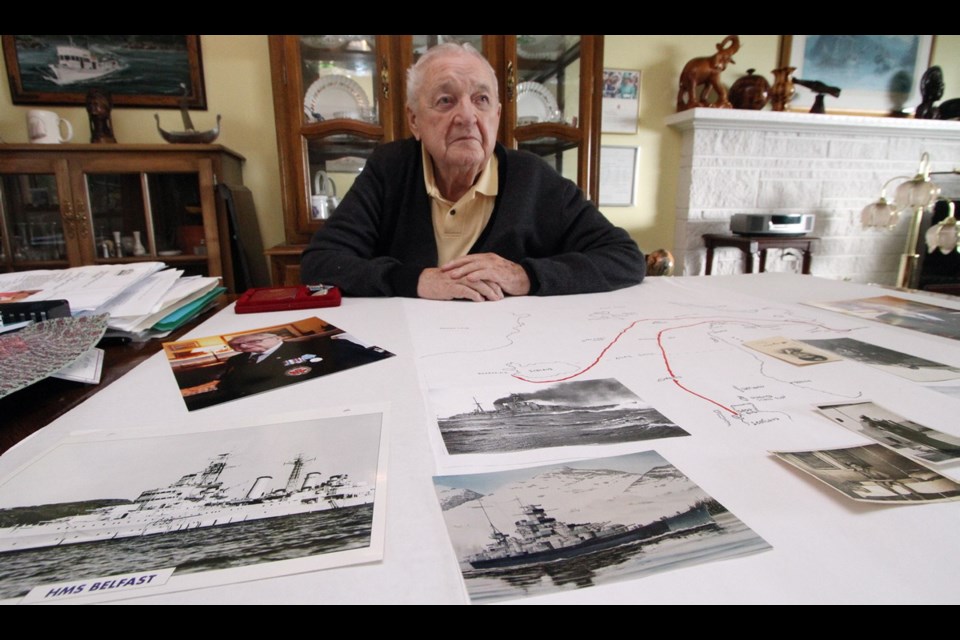Christmas, 1943, and a deadly game of cat and rat was underway in heavy seas atop Norway — the Royal Navy as cat and Nazi warship Scharnhorst the rat.
Unaware, however, of this pursuit were the sailors of 19 merchant vessels in Convoy JW55B. These ships, loaded with war supplies bound for Murmansk, Russia, were the cheese meant to lure the Nazi battle cruiser, Scharnhorst, into a fight.
“We were in very heavy seas and we were ordered to throttle back to eight knots,” said Tom McCulloch, 88, of Saanich, then an 18-year-old cadet aboard the merchant ship Ocean Viceroy.
“These were big, heavy cargo ships, and in a heavy gale when you are only going eight knots, you can’t control them,” said McCulloch, born in Greenock, Scotland, and now living in Gordon Head.
“We kept on wondering ‘What on earth is happening?’ ” he said. “What we didn’t realize was our convoy, JW55B, was bait.”
“The Royal Navy was trying to keep us out there to entice the Scharnhorst into making an attack,” McCulloch said.
And the Nazi battle cruiser bit. What followed was an engagement that has since become known as the Battle of the North Cape. It ended on Dec. 26 about 8 p.m. with the Scharnhorst capsized and sunk under gunfire and torpedoes. Of the 1,968 crew members, only 36 were rescued and taken prisoner.
Following that engagement, McCulloch went on to earn his credentials as a master mariner. He enjoyed a long career captaining a variety of vessels and immigrating to Canada, with wife, Doreen, in 1948.
Eventually, he became a hydrographer, measuring depths, tides and currents for shipping maps, first for Canada, but later for a variety of developing countries before retiring, finally, in 2002.
So it was a bolt from a place long forgotten when he received a message, in November, from the Russian Embassy in Ottawa.
“By decree of Vladimir Putin, President of the Russian Federation, of Sept. 30, 2012, you are awarded the Ushakov Medal,” read the letter.
The letter said the award was proof of President Putin’s high respect and gratitude for the courage and bravery shown on the Murmansk convoy during a difficult time in his nation’s history.
McCulloch was presented the medal on Feb. 1 in Vancouver. He learned 19 others in B.C. were awarded the Ushakov Medal, as well as 62 others living in Canada.
McCulloch said when he first received word, the memories of that time were nearly forgotten. But they came flooding back: the terror, the winds, big seas and the freezing, freezing conditions.
His own vessel was loaded with tanks, artillery pieces and shells. Ready for assembly were planes, carried in crates on deck. As a cadet, it was his job to routinely inspect the deck cargo to make sure it was secure in the pitching seas.
It was also his job to report the state of the ice build-up to the mate on duty. And if it was getting dangerously thick, its weight threatening to make the ship top-heavy, it was his job to lead a small party of sailors to break it up with chipping hammers.
McCulloch remembers that only days after departing Scotland, Convoy JW55B had already come under attack from German planes. Shortly after, McCulloch said it lost two ships to U-Boat sinkings. Seeing the flashes of guns on the horizon during the night of the battle, Boxing Day, 1943, the merchant sailors were more glad to be safe than interested in the fight.
The battleship Duke of York, cruisers Jamaica and Belfast, and destroyers Oppurtune, Virago, Musketeer and Matchless were all in on the Scharnhorst’s sinking.
McCulloch’s own ship, and the others, continued on to Murmansk safely. The port had suffered heavy damage from nightly bombings, so it took more than a month before his ship was unloaded and he was back in the U.K.
He said his wartime and career experiences have earned him several medals, including the Atlantic Star and the Queen’s Jubilee Medal. But the Ushakov Medal is something special.
“This is a real one,” he said. “This is for valour and bravery in the face of the enemy.”
“Russians only give it out to people who have undergone that,” said McCulloch. “So, it’s a very great honour.”



